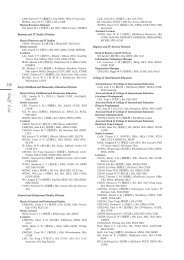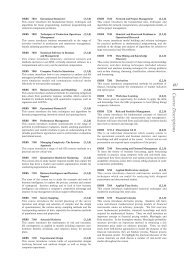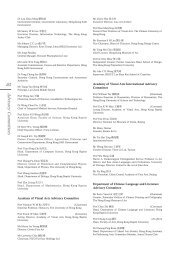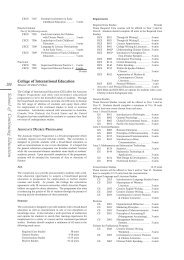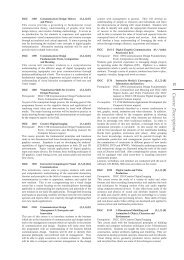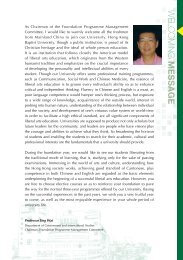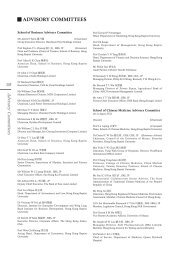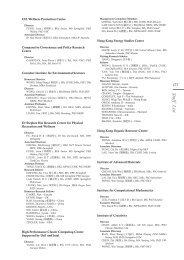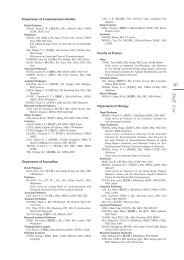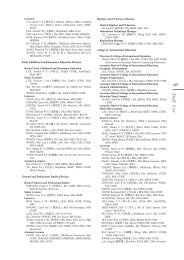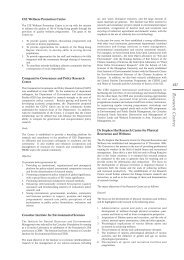304<strong>Course</strong> <strong>Descriptions</strong>microeconomic theory and statistical techniques to issues relatedto the production and distribution of medical services, anddecision making in health care markets. Through this course,students should be able to understand the role of economicincentives, competition, and regulation on the functioning ofthe health care market. The exposure of analyses related to theeconomic evaluation of medical services provides students theknowledge of economic justification on resource allocation amongdifferent medical programs and health care services.ECON 2025 Basic Statistical Methods (3,3,0) (E)This course trains students to acquire the ability of analyzinghuman, social behaviour, and business decision by using statisticalmethods. The course emphasizes conceptual understanding ofvarious statistical techniques and their accompanying limitations.Furthermore, students will learn how to apply the statisticaltheories to handle large quantities of data and solve statisticalproblems through readily available computer packages. Thiscourse will help students build up a solid basis for studyingeconometrics at a later stage.ECON 2026 Comparative Economics (3,3,0) (E)Prerequisite: ECON 1007 Basic Economic Principles or CHSE1005 Essentials of EconomicsThis course aims to provide students with the basic conceptualtools for evaluating and comparing different economies of theworld. A generally focus approach will be adopted to encouragestudent to have a general understanding of how economic systemswork and how economic theory interacts with government policy,history, culture, social, political and philosophical factors toexplain economic performance and evolution. A wide range ofcurrent issues confronting economic transition, structural changewill also be emphasized. Country studies will include marketcapitalist countries (e.g. the U.S., Japan, France, Sweden, Britishand Germany), and the transforming former socialist economies(e.g. the Russian, Poland, Hungary and other East-European).ECON 2027 Transition and Emerging (3,3,0) (E)EconomiesPrerequisite: ECON 1007 Basic Economic Principles or CHSE1005 Essentials of Economics or EquivalentThis course aims to provide a deeper understanding and insightsinto the backgrounds and characteristics of emerging economies(such as China, India, Mexico, Brazil, Russia, etc.) and thetransition economies of Eastern Europe and Asia (such asVietnam and the central Asia countries). Comparative analyticaltools and techniques will be employed to investigate importantaspects concerning the current economic growth and performance,business environment and opportunities across widely differingemerging and transition economies; and issues of economicattractiveness, difficulties and challenges will be discussed.This course will enable students to broaden their internationalunderstanding of the growing importance of the emerging andtransition markets.ECON 2035 Introduction to Technical Analysis (3,3,0) (E)This course aims to analyse market data by using mainstreamtechnical analysis techniques such as chart pattern analysis andmoving average. Technical analysis involves the use of historicalstock prices, volume, and other related data to forecast futureprice movements. Its objective is to identify trend changes at anearly stage based on information available. In this course, wewill introduce contemporary approaches to technical analysis. Inparticular, we will examine the performance of technical tradingrules in different markets.ECON 2036 Crisis Economics (3,3,0) (E)This course attempts to review the historical experiences of thefour major financial crises that had happened around the World:The great depression in 1929-1931, the Japanese financial crisis inthe 1990s, the Asian financial crisis in 1997 and the US financialmeltdown in 2008. The central focuses are to understand whythese crises occur and to evaluate effectiveness of the governmentpolicies that dealt with these crises. Lessons of the crises policiesand proposals to reform the financial system will be discussedduring the lectures.ECON 2110 Intermediate Microeconomics (3,3,0) (E)Prerequisite: ECON 1210 Principles of MicroeconomicsBuilt on the foundation of the course “Principles ofMicroeconomics”, this course provides a comprehensivetreatment of microeconomics from the viewpoints of policy aswell as theory. It aims at achieving, in a balanced manner, twoequally important objectives: (1) serving as a satisfactory inputto other more specialized courses within the major; and (2)providing appropriate training to students taking the major, manyof whom are expected to become executives in large enterprisesand organizations, applied economic researchers, analysts andforecasters, business journalists and teachers, and who willtherefore need a concrete understanding of as wide a range oftheoretical and policy topics as possible. As the sequel to ECON1210, this course will probe further into the rationality behindsome standard theories and introduce recent development ineconomic theory.ECON 2120 Intermediate Macroeconomics (3,3,0) (E)Prerequisite: ECON 1220 Principles of MacroeconomicsBuilt on the foundation of the course “Principles ofMacroeconomics”, this course provides a comprehensivetreatment of macroeconomics from the viewpoints of policy aswell as theory. It aims at achieving, in a balanced manner, twoequally important objectives: (1) serving as a satisfactory inputto other more specialized courses within the option; and (2)providing appropriate training to students taking the option, manyof whom are expected to become executives in large enterprisesand organizations, applied economic researchers, analysts andforecasters, business journalists and teachers, and who willtherefore need a concrete understanding of as wide a range oftheoretical and policy topics as possible. As the sequel to ECON1220, this course will probe further into the rationality behindsome standard theories and introduce recent development ineconomic theory.ECON 2130 Money and Banking (3,3,0) (E)Prerequisite: ECON 1220 Principles of Macroeconomics orECON 1620 Basic Economic PrinciplesThis course aims to provide a general survey of financialinstitutions and markets, bank management, monetary theory andpolicy, and to help students understand why the financial systemis organized as it is and how the financial system and economyare interconnected. Students are expected to link the monetaryand financial theories and international experiences learned in thelectures to the local financial system and monetary arrangements.ECON 2140 Transition and Emerging Economies (3,3,0) (E)Prerequisite: ECON 1620 Basic Economic PrinciplesThis course aims to provide a deeper understanding and insightsinto the backgrounds and characteristics of emerging economies(such as China, India, Mexico, Brazil and Russia) and thetransition economies of Eastern Europe and Asia (such asVietnam and the central Asia countries). Comparative analyticaltools and techniques will be employed to investigate importantaspects concerning the current economic growth and performance,business environment and opportunities across widely differingemerging and transition economies; and issues of economicattractiveness, difficulties and challenges will be discussed.This course will enable students to broaden their internationalunderstanding of the growing importance of the emerging andtransition markets.ECON 2170 Applied Econometrics (3,3,0) (E)Prerequisite: BUS 1200 Statistics for Business or ECON 1150Fundamentals of Quantitative Methods orequivalentThis course aims at giving students basic understanding ofeconometrics theories and applying econometric techniques to
specific empirical economic problems. Numerous examples areexamined to achieve this goal. Emphasis is placed on the classicallinear model, least squares estimation, hypothesis testing, andmodel building. Econometric models are then adopted to analysepractical problems and make forecasts. Furthermore, students aretrained in this course to use computer statistical software.ECON 2180 Comparative Economics (3,3,0)Prerequisite: ECON 1120 Principles of Macroeconomics orECON 1620 Basic Economic PrinciplesThis course aims to provide students with the basic conceptualtools for evaluating and comparing different economies of theworld. A generally focus approach will be adopted to encouragestudent to have a general understanding of how economic systemswork and how economic theory interacts with government policy,history, culture, social, political and philosophical factors toexplain economic performance and evolution. A wide range ofcurrent issues confronting economic transition structural changewill also be emphasized. Country studies will include marketcapitalist countries (e.g. the US, Japan, France, Sweden, Britishand Germany), and the transforming former socialist economies(e.g. Russia, Poland, Hungary and other East-European).ECON 2230 Intermediate Microeconomics for (3,3,0) (E)China StudiesPrerequisite: ECON 1620 Basic Economic PrinciplesThis course aims at providing students with more knowledge ofeconomic theories which are relevant for the analysis of bothmarket economies and planned economies, as well as systemswhich are in the process of transition. After discussing majorapproaches to the investigation of different microeconomicphenomena, efficiency and welfare issues concerning capitalistand socialist systems will be covered, leading to a study ofmicroeconomic transition options. Students will be familiarizedwith examples involving China through exercises.ECON 2240 Intermediate Macroeconomics for (3,3,0) (E)China StudiesPrerequisite: ECON 1620 Basic Economic PrinciplesThis course covers macroeconomic theories applicable to bothmarket economies and centrally planned economies in the prereformand the post-reform eras. Closed and open economyversions, as well as relevant growth models, will be investigated.ECON 2250 Introduction to Technical Analysis (3,3,0) (E)This course aims to analyse market data by using mainstreamtechnical analysis techniques such as chart pattern analysis andmoving average. Technical analysis involves the use of historicalstock prices, volume, and other related data to forecast futureprice movements. Its objective is to identify trend changes at anearly stage based on information available. In this course, wewill introduce contemporary approaches to technical analysis. Inparticular, we will examine the performance of technical tradingrules in different markets.ECON 2260 Crisis Economics (3,3,0) (E)This course attempts to review the historical experiences of thefour major financial crises that had happened around the World:The great depression in 1929–1931, the Japanese financial crisis inthe 1990s, the Asian financial crisis in 1997 and the US financialmeltdown in 2008. The central focuses are to understand whythese crises occur and to evaluate effectiveness of the governmentpolicies that dealt with these crises. Lessons of the crises policiesand proposals to reform the financial system will be discussedduring the lectures.ECON 2510 Medical Economics (3,3,0) (E)The primary purpose of the course is to apply basic economicsconcepts to the study of health and medical (health) care. Inparticular, emphasis would be placed on the application ofmicroeconomic theory and statistical techniques to issue related tothe production and distribution of medical services, and decisionmaking in health care markets. Through this course, studentsshould be able to understand the role of economic incentives,competition, and regulation on the functioning of the healthcare market. The exposure of analyses related to the economicevaluation of medical services provides students the knowledgeof economic justification on resource allocation among differentmedical programmes and health care services.ECON 2610 Asia-Pacific Economies (3,3,0) (E)This course aims to introduce to students a general survey ofeconomic development in the Asia Pacific region. It is designedto help students to be familiarized with economic affairs inthe region and equip themselves with basic analytical tools fortackling economic issues. Socio-economic factors and changesin the global environment that have given rise to the “East Asianmiracle”, the subsequent financial crisis in 1997, and the followingdevelopment will be carefully analysed. Emphasis will be placedon the understanding of economic problems in the real world.ECON 2620 Information Economy (3,3,0)This course aims to introduce to students the economic conceptsand tools for analysing the operation of the information economy,which is characterized by the widespread application of personalcomputers and the Internet. The features of information goodswill be identified and new business strategies in the sector will beanalysed. The impact of the information technology revolutionon the economy as well as the challenges that have been brought topolicy-makers will also be discussed. Emphasis will not be placedon formal mathematical modelling. Interested students from allfaculties are expected to find no difficulty in understanding thecourse content.ECON 2640 Economic Environment in China (3,3,0) (P)Prerequisite: PA 0101 Principles of Microeconomics orequivalentThis course aims at providing students with basic knowledge aboutChina’s economic environment where business activities takeplace. Developments in the domestic economy will be studied,followed by investigations into trends of foreign trade and foreigninvestments in China. After taking this course, the studentsshould be able to evaluate the economic situation in terms of theperformance and policy changes in key economic sectors.ECON 2650 Mathematical Analysis for (3,3,0) (E)EconomicsPrerequisite: BUS 1190 Mathematics for Business or ECON1150 Fundamentals of Quantitative Methods orequivalentThis course aims to provide students exposure to commonmathematical analyses of economics. It maintains a balancebetween economic theories and mathematical vigorous. Studentsare trained to solve economic problems with mathematics. Majoremphasis is placed on conducting comparative static analysesusing mathematical techniques.ECON 2660 Economies of <strong>Hong</strong> <strong>Kong</strong> and the (3,3,0) (E)Pan-Pearl River DeltaPrerequisite: CHSE 1010/ECON 1010 Introductory EconomicAnalysis for China Studies or ECON 1220Principles of Macroeconomics or ECON 1620Basic Economic PrinciplesThis course aims to provide students with a systematicunderstanding of the post-war development of the <strong>Hong</strong> <strong>Kong</strong>economy and the economic relationship between <strong>Hong</strong> <strong>Kong</strong>and the Pan-Pearl River Delta (PPRD), especially after Chinaadopted its open-door policy and economic reform since 1978.Macroeconomic environment and policy issues of <strong>Hong</strong> <strong>Kong</strong> willbe examined. Economic characteristics of the PPRD, competitionand complementarities between <strong>Hong</strong> <strong>Kong</strong> and the PPRD willbe studied. The prospect and strategy of closer economic cooperationbetween <strong>Hong</strong> <strong>Kong</strong> and the PPRD will be examined.It is expected that after attending this course students willunderstand more <strong>Hong</strong> <strong>Kong</strong>’s macroeconomic environment andits economic relationship with the PPRD upon which informeddecision could be made in business and other areas.305<strong>Course</strong> <strong>Descriptions</strong>
- Page 3: economic growth, trade, pollution,
- Page 7 and 8: of private enterprises in the indus
- Page 9 and 10: period. The first part of the cours
- Page 11 and 12: The reactions and effectiveness of
- Page 14: 314Course DescriptionsEDUC 3080 Tea
- Page 17 and 18: development of children and adolesc
- Page 19 and 20: and communication skills in differe
- Page 21 and 22: y ubiquitous technology. Learners w
- Page 23 and 24: ENG 2650 Topics in English Grammar
- Page 25 and 26: clause structures of the English la
- Page 27 and 28: adopted for reading and interpretin
- Page 29 and 30: drama; and (2) introduce Western dr
- Page 31 and 32: ENGL 4005 Advanced Topic in Compara
- Page 33 and 34: attendant to the break-up of mediev
- Page 35 and 36: EURO 3205 Comparative Politics of (
- Page 37 and 38: states, enlargement provides signif
- Page 39 and 40: to create and develop ideas via rel
- Page 41 and 42: strategies of awarded campaigns to
- Page 43 and 44: characteristics of films, film-make
- Page 46: 346Course DescriptionsFINE 1005 Fin
- Page 49 and 50: GCHC 1005 China and the Global Econ
- Page 51 and 52: the period with a special focus on
- Page 53 and 54: est decision-making procedures. Mor
- Page 55 and 56:
GCPE 1065 Table Tennis (1,2,0) (C)T
- Page 57 and 58:
and/or philosophical traditions the
- Page 59 and 60:
on the use of English in various se
- Page 61 and 62:
GDAR 1835 Music, Mind, and Human (3
- Page 63 and 64:
lead to successful development of n
- Page 65 and 66:
management and proactive stakeholde
- Page 67 and 68:
GDCV 1065 Buildings of Hong Kong: (
- Page 69 and 70:
of various religions that broaden t
- Page 71 and 72:
their implications for contemporary
- Page 73 and 74:
gone through since 1945 included th
- Page 75 and 76:
GEOG 1005 Geography and the Contemp
- Page 77 and 78:
students to the concepts and techni
- Page 79 and 80:
GEOG 3730 Energy Policy and Analysi
- Page 81 and 82:
processes interact with China’s s
- Page 83 and 84:
GERM 1006 German II (3,3,0) (G)Prer



